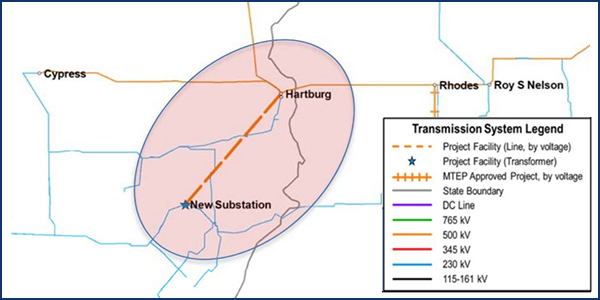By Amanda Durish Cook
TRAVERSE CITY, Mich. — MISO on Tuesday acknowledged that it might be forced to change course on its second-ever competitively bid transmission project after the passage of a Texas law giving incumbent utilities right of first refusal (ROFR) for any projects built in the state.
Details remain scant, but the RTO now says the Hartburg-Sabine project “may face challenges as a result of recent Texas legislation.” (See Texas ROFR Law Clouds Hartburg-Sabine Future.) Project developer NextEra Energy on Monday filed suit in federal court challenging the ROFR law. (See related story, NextEra Takes Texas to Court over ROFR Law.)
Speaking at a June 18 meeting of the MISO Board of Directors’ System Planning Committee, Executive Director of System Planning Aubrey Johnson confirmed that the new Texas statute applies to Hartburg-Sabine, although it’s still unclear how the law will affect the project.
Johnson said staff are reviewing the new law and the Tariff to determine how the rules might interact “in accordance with regional transmission plans and state laws.”
Committee Chair Mark Johnson noted the status of the project is undoubtedly causing some “burning questions right now” among stakeholders and said it would be discussed in the committee’s closed session immediately following the meeting.
MISO in November selected NextEra Energy Transmission Midwest’s $115 million bid to construct the 500-kV Hartburg-Sabine project in East Texas, which would include a new 23-mile 500-kV transmission line, four short 230-kV lines and the new Stonewood 500-kV substation. NextEra’s proposal beat 11 other competitors, scoring 97 out of a possible 100 points under the RTO’s selection criteria. (See NextEra Wins Bid to Build MISO’s 2nd Competitive Project.)
Meanwhile, MISO continues to hold monthly meetings with Republic Transmission, developer of the RTO’s first competitive project, the $62.4 million Duff-Coleman 345-kV transmission line in southern Indiana and western Kentucky, Johnson said. That project is so far going off without a hitch, she added, and is on track to be in service by January 2021 — or possibly earlier.
During sector introductions at MISO’s June 19 Advisory Committee meeting, Competitive Transmission Developers Sector representative Steve Rowley touted the cost benefits that competitive developers offer through lower bids and project cost caps.
An April report released by The Brattle Group found electricity customers could save $8 billion over five years if competitive transmission planning processes expanded to cover a third of all transmission investments, compared with just 3% today. But another study published by Concentric Energy Advisors this month questioned that conclusion, claiming incumbent transmission owners’ initial cost estimates for projects generally prove to be accurate. (See Study Findings Clash on Value of Competitive Tx.)





